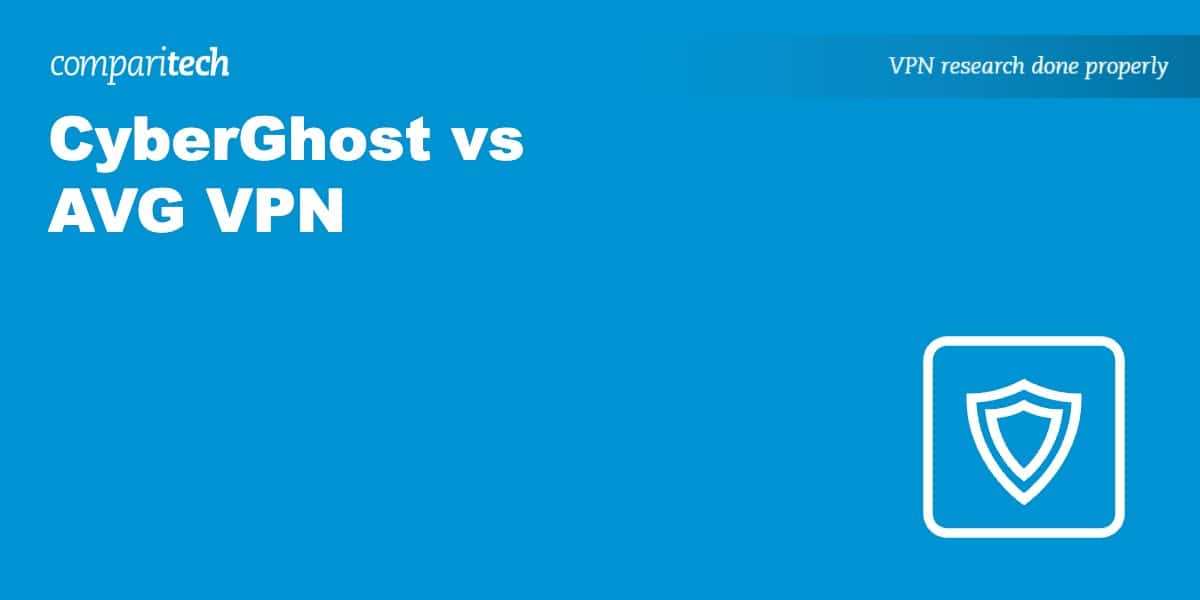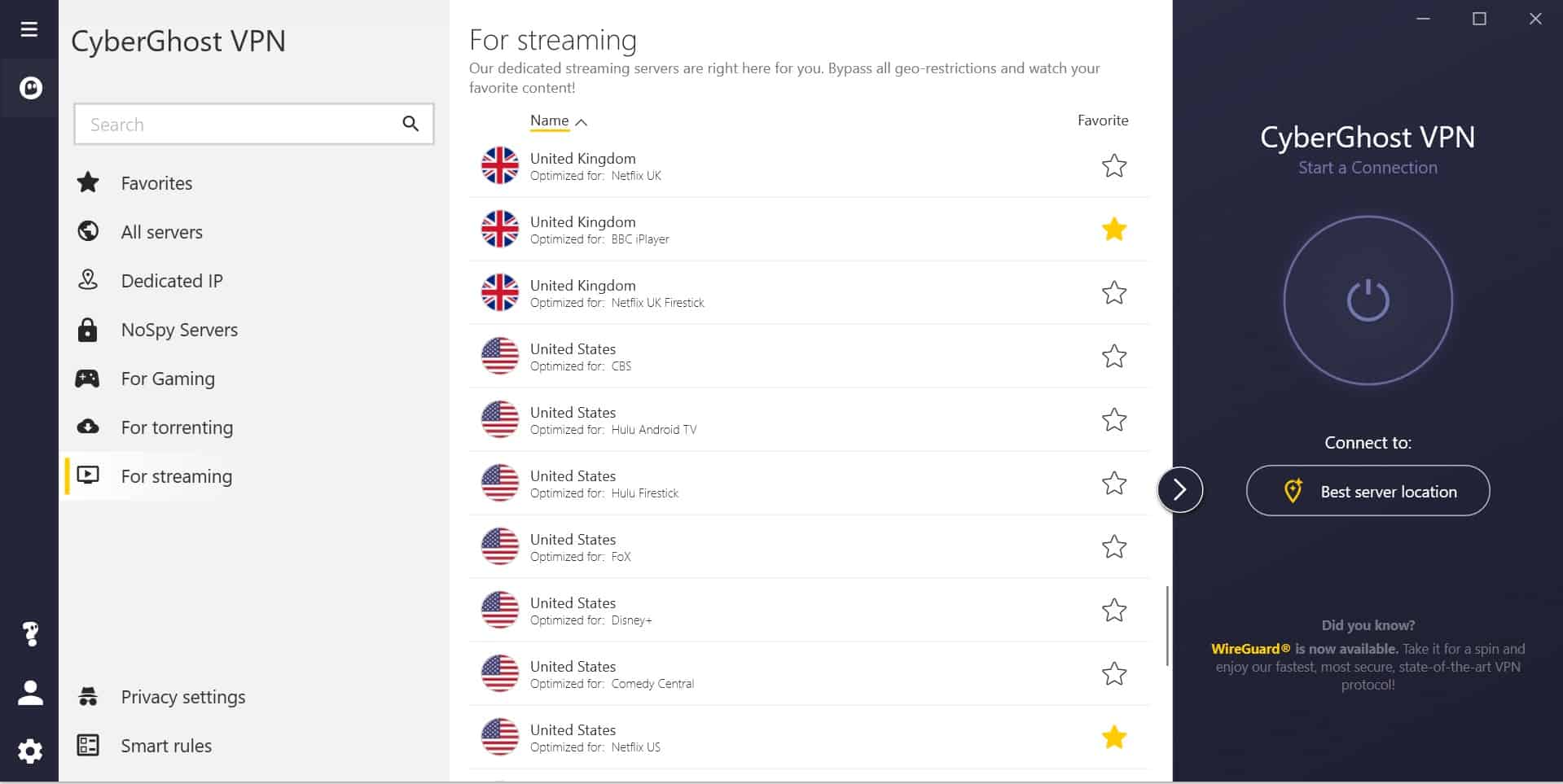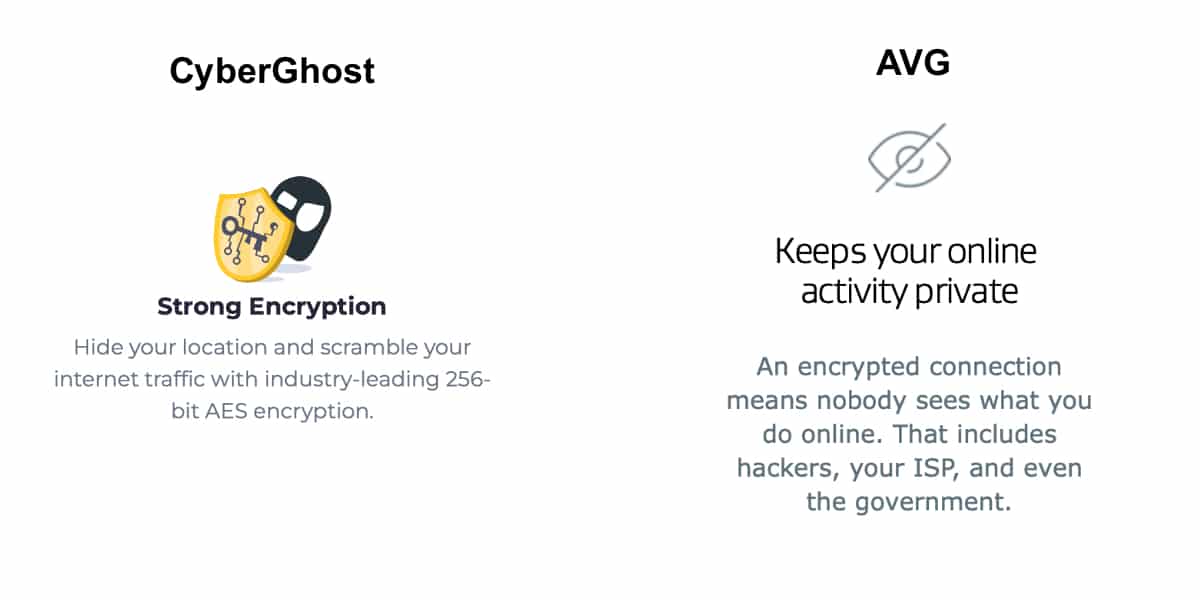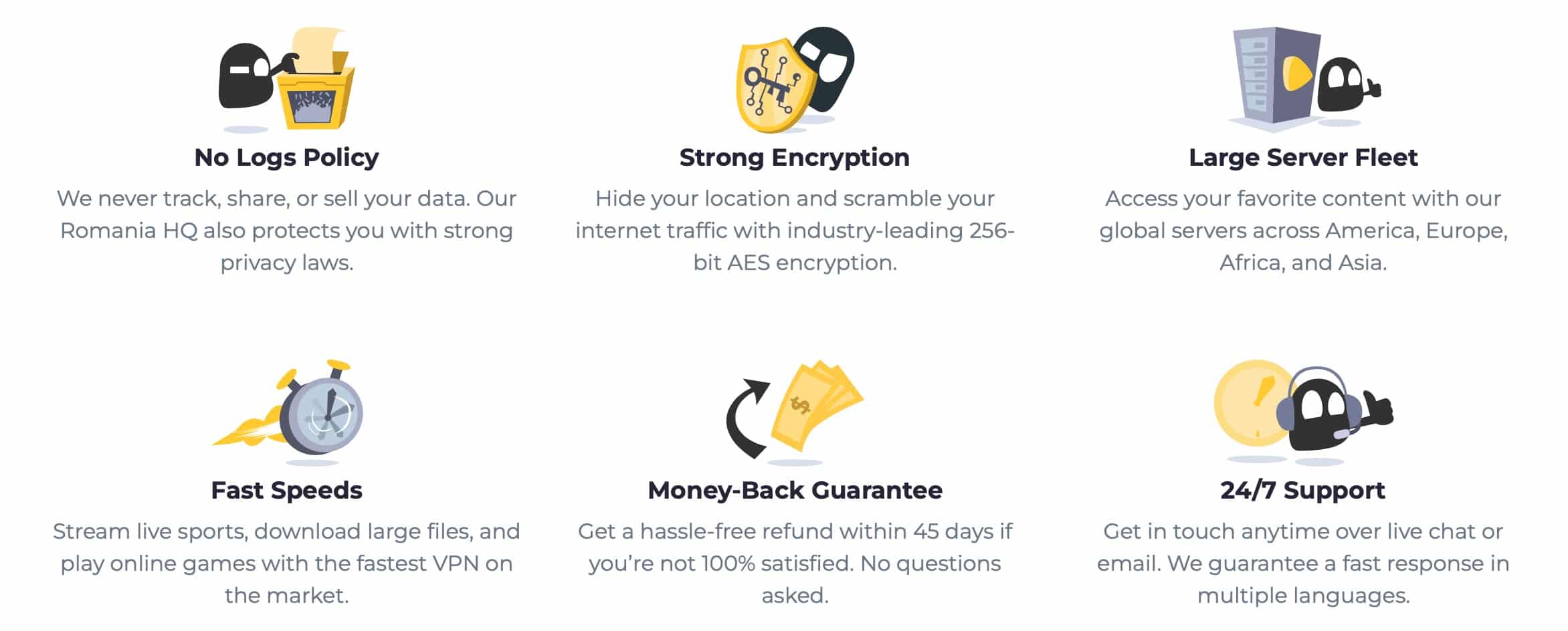In this post, we’re comparing CyberGhost and AVG VPN to assess which one of the two represents the best value to VPN users.
If you’re trying to decide which VPN provider to sign up for, you’ve probably realized by now that you can’t just look at each provider’s marketing to figure it out. Marketing is marketing, and facts are facts. And rummaging through each provider’s marketing won’t make their differences obvious – particularly if they’re well-established VPN providers. But there are differences, ranging from the subtle to the obvious, and we’ll highlight them in this comparative review.
Highlights
CyberGhost
|
AVG VPN
|
CyberGhost vs AVG VPN pricing
| CyberGhost | AVG VPN | |
| Subscription periods | One month | n/a |
| One year | One year | |
| Two years | Two years | |
| Three years | Three years | |
| n/a | 60-day free trial | |
| Special offer | ||
| Highest price per month | $12.99 | $4.49 |
| Lowest price per month | $2.75 | $4.39 |
| One-year price | $71.88 | $53.88 |
| Money-back guarantee | 14 days for monthly subscriptions, 45 days for others | 30 days |
AVG VPN is cheaper as far as monthly and yearly subscriptions go. If you go with a longer-term subscription, then CyberGhost becomes the least expensive of the two providers. But that means you’ll have to commit to a three-year term for CyberGhost’s price to fall below AVG VPN. The price you pay will depend on the commitment you’re willing to make. If you simply want to try a VPN service for a month, AVG VPN asks for less money.
AVG VPN offers the industry standard 30-day money-back guarantee for all its subscriptions. CyberGhost, on the other hand, provides different refund policies for different subscriptions. For a monthly subscription, it’s 14 days. Longer-term subscriptions get a generous 45 days.
Features
| CyberGhost | AVG VPN | |
|---|---|---|
| Simultaneous connections | 7 | 10 |
| Operating system apps | Windows, macOS, Android, iOS, Amazon Fire | Windows, macOS, Android, iOS |
| Manual install devices | Linux, routers, set-top boxes | No |
| Split tunneling | Yes (with the Exceptions feature) | Yes (Android only) |
| Free extras | Ad-blocking, malware scanning, browser extensions for Chrome and Firefox | No |
While CyberGhost supports more platforms, AVG VPN allows for more simultaneous connections. CyberGhost allows for up to seven simultaneous connections. AVG VPN allows 10. Three more simultaneous connections can make a difference to some.
Regarding device support, CyberGhost provides an extra Amazon Fire app and supports manual configurations on Linux, routers, and TV set-top boxes.
AVG VPN doesn’t provide any kind of ad or malware blocking, whereas CyberGhost supports both. CyberGhost also includes browser extensions for Chrome and Firefox. AVG VPN does not.
Both providers support split tunneling, but CyberGhost’s support for the feature is more comprehensive. AVG VPN only supports the feature on Android. However, the way the feature is implemented differs for each provider. CyberGhost, with its Exceptions feature, allows you to specify a list of websites that won’t go through the VPN tunnel, sending the traffic through your ISP connection instead.
AVG VPN’s implementation of the feature is more typical: it works on an app-by-app basis. So with AVG VPN (on Android), you can choose which apps go through the VPN tunnel and which ones do not.
With CyberGhost, you have to use the OpenVPN protocol for the Exceptions feature to be available. With AVG VPN, there’s no such restriction.
Speed
| Speed | CyberGhost | AVG VPN |
|---|---|---|
| North America | 845 Mbps | 655 Mbps |
| Europe | 480 Mbps | 374 Mbps |
| Asia | 312 Mbps | 269 Mbps |
| Global | 548 Mbps | 399 Mbps |
CyberGhost is the faster of the two providers and scores higher in all the regions we tested. But AVG VPN’s speeds are still excellent. I used the WireGuard protocol for both providers.
So while CyberGhost is somewhat faster than AVG VPN, both providers offer very good speeds. You wouldn’t feel a speed hit with either provider when going about your online activities.
CyberGhost vs AVG VPN streaming capabilities
| CyberGhost | AVG VPN | |
|---|---|---|
| Streaming service | ||
| Netflix | UK, US, Denmark, Germany, France, Italy, Spain, Netherlands, Australia, and a few others | No |
| Hulu | US, Japan | No |
| Sky Go | Yes | No |
| Amazon Prime Video | Yes | No |
| BBC iPlayer | Yes | No |
| ABC | Yes | No |
| CBS | Yes | No |
| NBC | Yes | No |
| ITV Hub | Yes | Yes |
| Channel 4 (All 4) | Yes | No |
There are significant differences between CyberGhost and AVG VPN regarding streaming. CyberGhost’s streaming support is exceptionally good. It supports almost every streaming service out there.
While AVG VPN does support streaming, the number of sites it supports is small. Very small. Using AVG VPN, we could only access Netflix and ITV Hub. That’s it.
If streaming over VPN is important to you, you may want to sign-up for a CyberGhost subscription rather than AVG VPN.
Both providers’ apps display sublists of servers based on the task you’re looking to accomplish. A list of tasks or functions is displayed on the left side of the UI of both apps. Streaming and Torrenting can be selected in either app, and a list of dedicated servers will be displayed on the right for you to choose from.
China
AVG VPN claims to work in China. CyberGhost does not.
CyberGhost states, in the Support section of its website, that its software seldom works in China and that it likely wouldn’t work if it could bypass China’s Great Firewall. Its Support team also informed Comparitech that some Chinese ISPs block access to CyberGhost’s website. So even installing CyberGhost’s app would be a technical challenge in China.
AVG VPN, on the other hand, claims to work in China. But it also claims that support from China is hit and miss and may well require some trial and error and a bit of server-surfing. That tends to be the case with many providers, even though some make more confident claims than AVG VPN regarding working in China.
You can look at our post VPN providers that work in China.
Setup and interface
| CyberGhost | AVG VPN | |
|---|---|---|
| Automatic setup wizard | Windows, macOS, Android, iOS, Amazon Fire TV/ Firestick | Windows, macOS, Android, iOS |
| Main location selection | List-based or task-based | List-based or task-based |
| Extra settings pages | Yes | Yes |
| Mobile friendly | Yes | Yes |
In terms of design, CyberGhost provides a well-designed desktop app that should be easy to understand even for greener users. With CyberGhost’s apps, you can search for servers by country, city, or by selecting a task on the left side of the app. Once you’ve chosen a task, a sublist of dedicated servers is displayed on the right.
AVG VPN’s server selection approach is similar to CyberGhost, but with fewer tasks listed in its app. As with CyberGhost, you can select servers based on continent and choose the country and city you want. Alternatively, you can also select a task on the left. Your options are Streaming or Torrenting.
So the apps are very similar in that regard.
Both providers’ apps give you a Settings page where you can customize your options. There’s nothing too complex in either app, but both cover the basics. And that’s probably a good thing, as exposing too many settings to users can intimidate new and less technical users. However, some advanced users may appreciate more granularity.
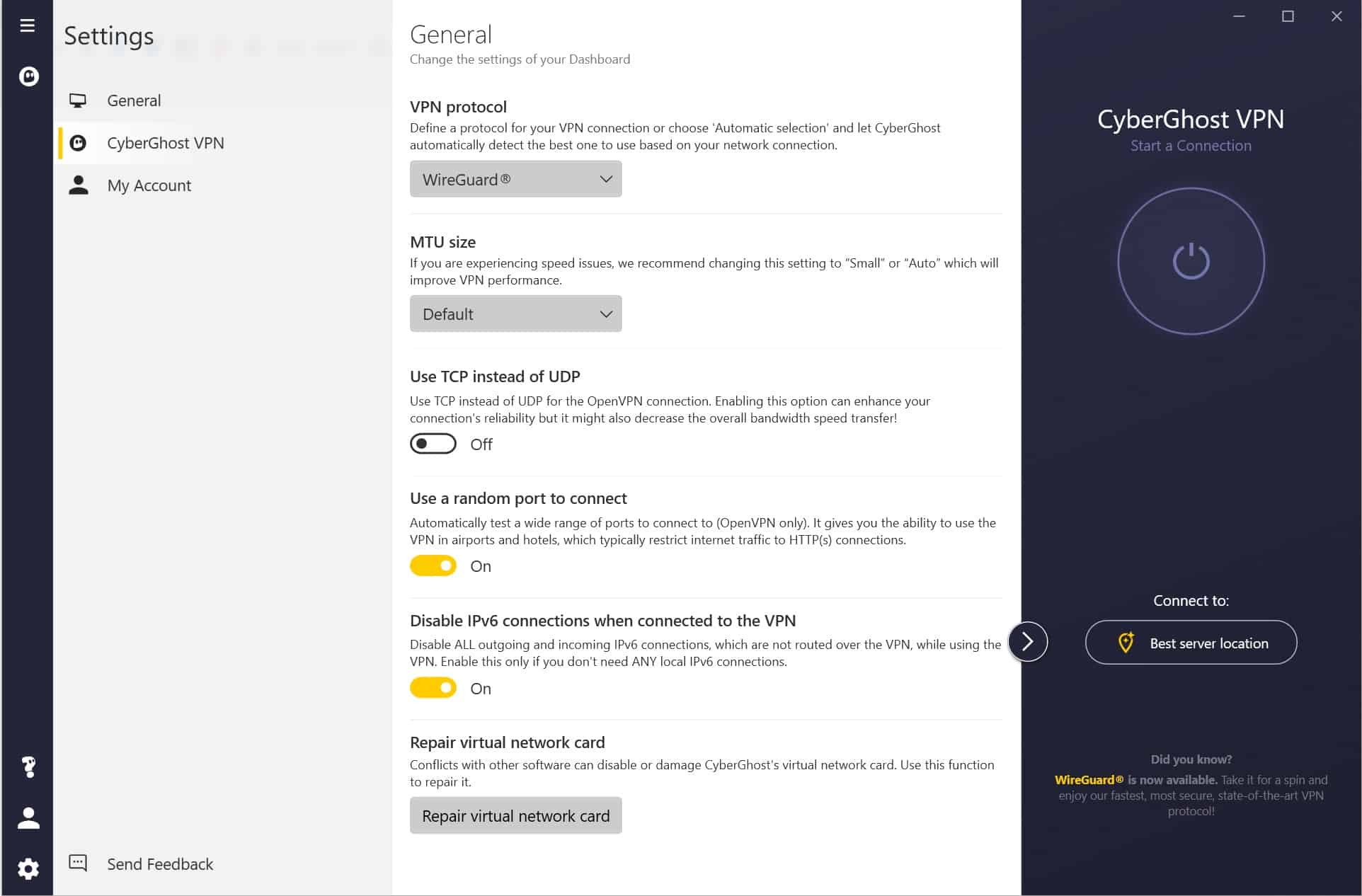
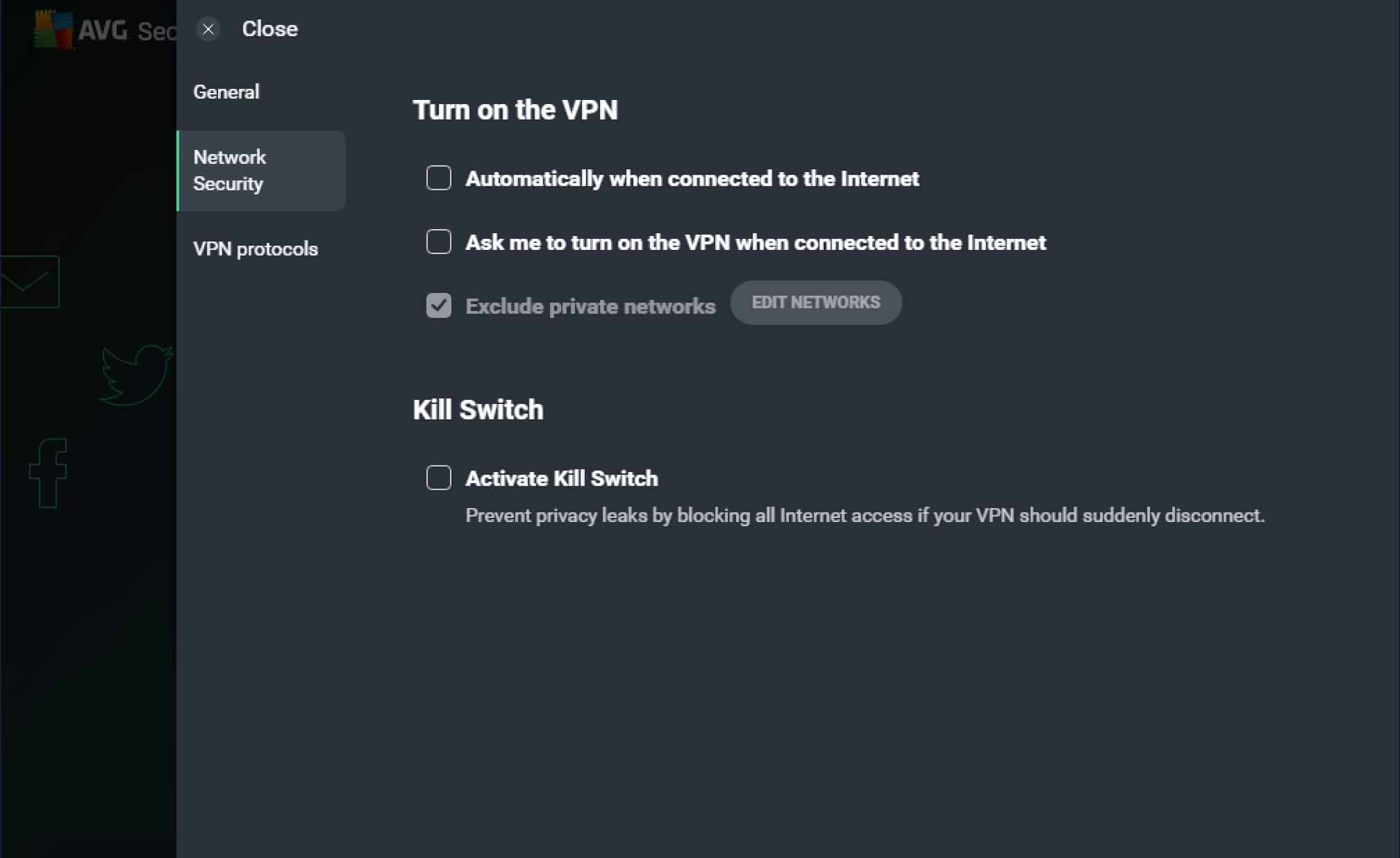
CyberGhost and AVG VPN both provide mobile apps for iOS and Android. Both apps are easy to use and work well on smaller screens.
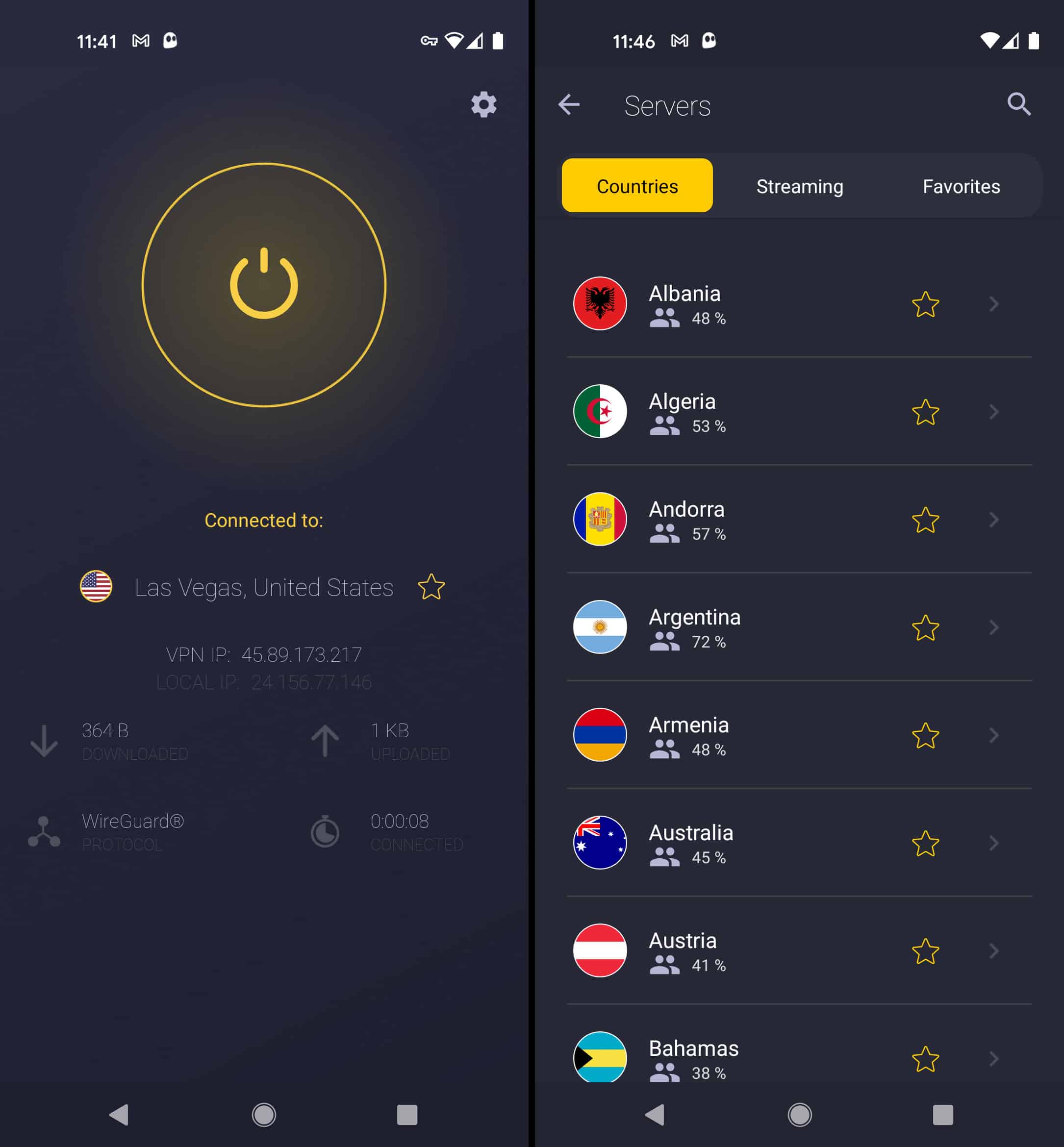
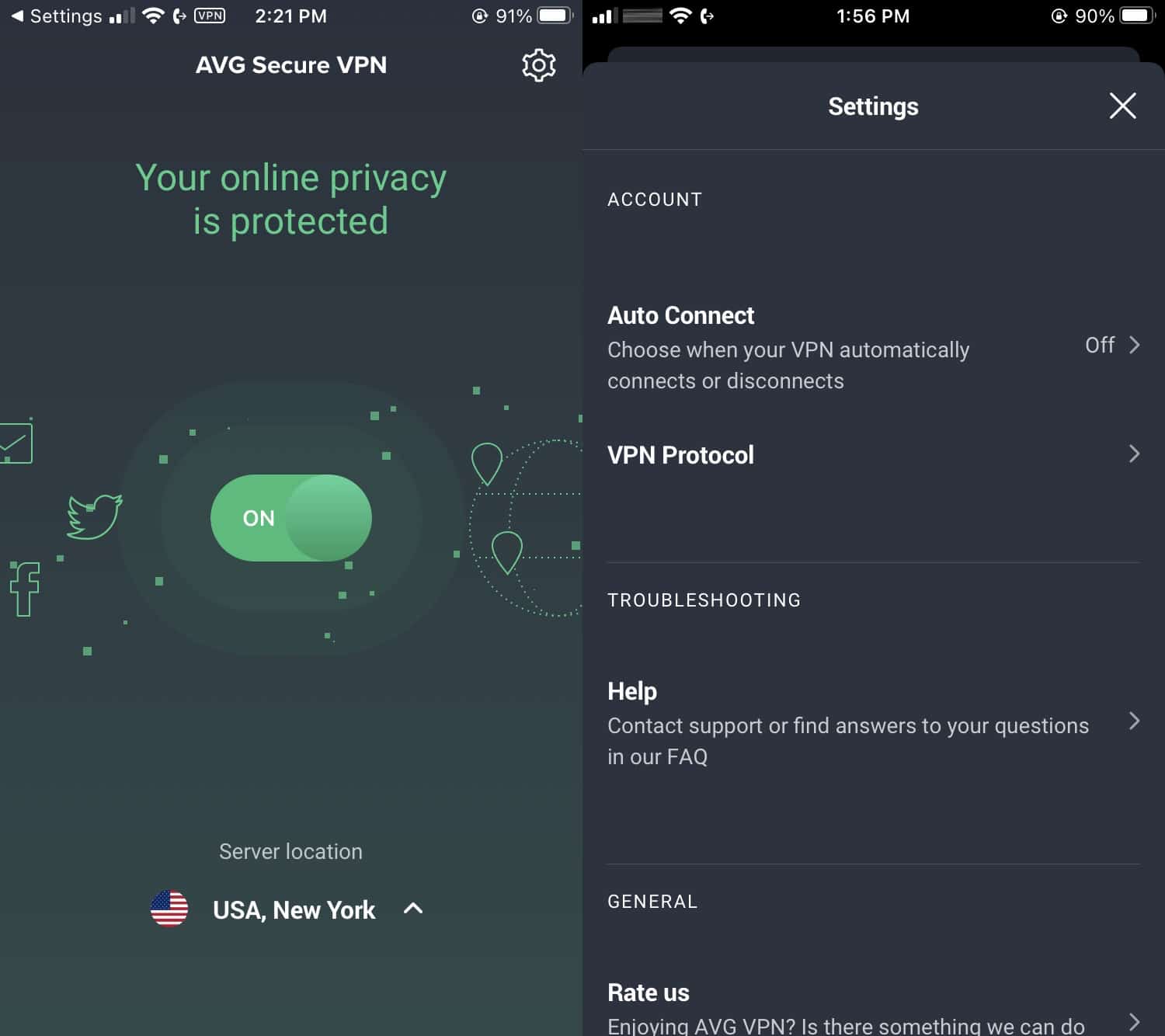
Servers and performance
| CyberGhost | AVG VPN | |
|---|---|---|
| Server countries | 91 | 37 |
| Total number of servers | 8,999 | 700 |
CyberGhost is the clear winner in this category. It provides more servers in more countries than AVG VPN. Still, AVG VPN’s numbers aren’t bad. 700+ servers in 37+ countries should be more than enough for anyone, in my book. But many VPN users prefer having access to a vast number of servers. If that’s you, CyberGhost is the way to go.
Below is a table listing all the countries where each provider hosts VPN servers:
| CyberGhost | AVG VPN | |
|---|---|---|
| Andorra | ✔ | |
| Albania | ✔ | |
| Argentina | ✔ | |
| Australia | ✔ | ✔ |
| Austria | ✔ | ✔ |
| Algeria | ✔ | |
| Armenia | ✔ | |
| Bahamas | ✔ | |
| Belarus | ✔ | |
| Belgium | ✔ | ✔ |
| Bangladesh | ✔ | |
| Bosnia and Herzegovina | ✔ | |
| Brazil | ✔ | ✔ |
| Bulgaria | ✔ | |
| Cambodia | ✔ | |
| Canada | ✔ | ✔ |
| Chile | ✔ | |
| China | ✔ | |
| Colombia | ✔ | |
| Costa Rica | ✔ | |
| Croatia | ✔ | |
| Cyprus | ✔ | |
| Czech Republic | ✔ | ✔ |
| Denmark | ✔ | ✔ |
| Egypt | ✔ | |
| Estonia | ✔ | |
| Finland | ✔ | ✔ |
| France | ✔ | ✔ |
| Georgia | ✔ | |
| Germany | ✔ | ✔ |
| Greece | ✔ | |
| Greeland | ✔ | |
| Hong Kong | ✔ | |
| Hungary | ✔ | ✔ |
| Iceland | ✔ | ✔ |
| India | ✔ | |
| Indonesia | ✔ | |
| Iran | ✔ | |
| Ireland | ✔ | ✔ |
| Isle of Man | ✔ | |
| Israel | ✔ | ✔ |
| Italy | ✔ | ✔ |
| Japan | ✔ | ✔ |
| Kazakhstan | ✔ | |
| Kenya | ✔ | |
| Latvia | ✔ | ✔ |
| Liechtenstein | ✔ | |
| Lithuania | ✔ | ✔ |
| Luxembourg | ✔ | |
| Macau | ✔ | |
| Macedonia | ✔ | |
| Malaysia | ✔ | ✔ |
| Malta | ✔ | |
| Mexico | ✔ | ✔ |
| Moldova | ✔ | |
| Monaco | ✔ | |
| Mongolia | ✔ | |
| Montenegro | ✔ | |
| Morocco | ✔ | |
| Netherlands | ✔ | ✔ |
| New Zealand | ✔ | ✔ |
| Nigeria | ✔ | |
| Norway | ✔ | ✔ |
| Pakistan | ✔ | |
| Panama | ✔ | |
| Peru | ||
| Philippines | ✔ | |
| Poland | ✔ | ✔ |
| Portugal | ✔ | ✔ |
| Qatar | ✔ | |
| Romania | ✔ | |
| Russia | ✔ | |
| Saudi Arabia | ✔ | |
| Serbia | ✔ | |
| Singapore | ✔ | ✔ |
| Slovakia | ✔ | |
| Slovenia | ✔ | |
| South Africa | ✔ | ✔ |
| South Korea | ✔ | ✔ |
| Spain | ✔ | ✔ |
| Sri Lanka | ✔ | |
| Sweden | ✔ | ✔ |
| Switzerland | ✔ | ✔ |
| Taiwan | ✔ | ✔ |
| Thailand | ✔ | |
| Turkey | ✔ | ✔ |
| United Arab Emirates | ✔ | |
| United Kingdom | ✔ | ✔ |
| United States | ✔ | ✔ |
| Ukraine | ✔ | ✔ |
| Venezuela | ✔ | |
| Vietnam | ✔ |
Security
| CyberGhost | AVG VPN | |
|---|---|---|
| VPN protocols | OpenVPN, WireGuard, IKEv2 | OpenVPN, WireGuard, IKEv2, Mimic |
| OpenVPN data encryption | AES-256 | AES-256 |
| OpenVPN control channel encryption | RSA-4096 | RSA-4096 |
| Cloaking technology | None | None |
| App security | Automatic wifi protection, kill switch | Kill switch |
| DNS status | Private DNS | Private DNS |
Protocol support is very similar between these two providers. They both support IKEv2, OpenVPN, and WireGuard. AVG VPN adds the proprietary Mimic protocol to its list. I can safely say that IKEv2, OpenVPN, and WireGuard are all deemed very secure. But I can’t speak for Mimic. The protocol is proprietary and closed-source, so it cannot be peer-reviewed. Its inner workings remain opaque. You have to cross your fingers that the devs got everything right. And the odds of that occurring are very low (for any dev team, anywhere). There are always blind spots, and peer audits are the only way to bring them to light.
So while I have no explicit reason to believe there’s anything wrong with the Mimic protocol, we have no visibility into its inner workings. I recommend avoiding it and using any of the open-source protocols available.
Both providers use 256-bit AES encryption with 4096-bit RSA keys for OpenVPN and IKEv2. WireGuard uses different ciphers, which are also deemed very secure. I cannot speak for Mimic.
CyberGhost and AVG VPN include a kill switch in their apps and use their own DNS servers within the VPN tunnel. Both providers are similar in terms of security. But CyberGhost wins for only supporting secure and open-source VPN protocols.
Privacy
| CyberGhost | AVG VPN | |
|---|---|---|
| HQ base | Romania | Czech Republic |
| Connection logs | Some | Yes |
| Activity logs | None | None |
| User details for sign-up | Email address | Email address |
| Anonymous payment options | Bitcoin | No |
CyberGhost is a Romania-based VPN provider. Romania does not have mandatory data retention laws, which is good for VPN providers. CyberGhost nonetheless collects limited connection logs for statistical purposes and claims that data cannot be used to identify a single user. So aside from that “light” data collection, CyberGhost adheres to its robust no-logging policy. It doesn’t log any of your internet activities and allows you to sign up with a disposable email address and pay via Bitcoin.
I should mention that in 2021, CyberGhost’s then-parent company, Crossrider, was caught distributing malware. Crossrider, now known as Kape, has since assured us that it discontinued that practice. Great, but it’s really not the kind of activity you want to see associated with a VPN provider. Organizations providing privacy services should not engage in anti-privacy business practices.
For AVG VPN’s part, it also has a bit of a shady past. In January 2020, it was reported that the Avast Antivirus and AVG VPN Antivirus programs were collecting user data and transferring it to Avast subsidiary, Jumpshot. Jumpshot would then repackage the data and sell it as a product to the highest bidder. Not exactly privacy-friendly either. In any case, in January 2020, Avast announced that it would discontinue the practice. Like CyberGhost, AVG VPN allows you to sign-up with a disposable email and accepts Bitcoin payments.
So both providers have a somewhat troubled past but have since made their mea culpa. I’ll leave it up to you to decide if that’s enough to garner your trust.
Configuration
| CyberGhost | AVG VPN | |
|---|---|---|
| Address allocation | Shared | Shared |
| Static IP address possible | No | No |
| DDoS protection | No | No |
| Ad & malware blocking | Yes | No |
Shared IP addresses are the industry standard in the commercial VPN space. And that’s because they’re better for user privacy. All users of a given VPN server are given the same public IP address with a shared IP address. Because they all share the same IP address, it’s much more difficult to correlate the server’s traffic to any individual VPN user.
As they should, both CyberGhost and AVG VPN provide shared IP addresses to their users on all servers. CyberGhost also offers the option (paid add-on) for a dedicated IP address, which can be helpful if you want to host some services behind the VPN.
CyberGhost also includes an ad and malware blocker. The blocking works by using a method called DNS blackholing. When you access a website on the internet, your DNS request will be referenced against your VPN provider’s list of known ad and malware domains. Whenever there’s a match, that connection gets blocked.
CyberGhost vs AVG VPN customer service
| CyberGhost | AVG VPN | |
|---|---|---|
| Live chat | Yes | No |
| Ticket support | Yes | Yes |
| Email support | Yes | No |
| Average email response time | 49 minutes | 17 hours |
| Phone support | No | Yes |
| Searchable knowledge base | Yes | Yes |
| Video guides | No | No |
CyberGhost provides email, live chat, and a ticket system in terms of support channels. Its website also hosts a searchable knowledge base with several FAQs to resolve common issues.
AVG VPN, on the other hand, offers telephone support and a ticketing system. It also claims to support live chat, but it has never been available in all the times I’ve tried to access it (and I tried many times). And because AVG VPN offers many different products, its Support section is difficult to find, and you really need to drill down to finally reach the AVG VPN Support page. So in terms of Support channels and availability, CyberGhost wins hands down.
To test each provider’s response time with Support emails, we sent them each three questions in three separate emails/tickets. The first two questions are generic and common. So we’re expecting canned responses for those questions (and there’s nothing wrong with that). We made the third question purposefully more challenging to answer as it requires a thorough understanding of VPNs. We did this to also assess how knowledgeable each provider’s representatives are. The third question differs for each provider because AVG VPN doesn’t provide browser extensions.
The results are below:
| CyberGhost | |||
|---|---|---|---|
| Question | Initial response time | Number of emails | Question answered |
| What kind of logs does CyberGhost keep? | 1 hour, 5 minutes | 1 | Yes |
| CyberGhost on a DD-WRT router? | 48 minutes | 1 | Yes |
| What's the difference between the CyberGhost app and the browser extension? | 34 minutes | 1 | Yes |
| AVG VPN | |||
|---|---|---|---|
| Question | Initial response time | Number of emails | Question answered |
| What kind of logs does AVG VPN keep? | 16 | 1 | Yes |
| AVG VPN on a DD-WRT router? | 18 | 1 | Yes |
| What’s the difference between Mimic and the other available protocols? | 18 | 1 | Yes |
Both providers answered all of my questions. And both providers’ answers were polite, concise, and informative. CyberGhost’s response time was stellar (i.e., under one hour). But I don’t think we should hold most providers to such a short deadline. I believe receiving an answer within 24 hours is very good support, and AVG VPN responded to all of my questions in under 24 hours. So CyberGhost wins again, but AVG VPN’s support was nonetheless excellent.
The winner: CyberGhost
CyberGhost takes it again. But it doesn’t blow AVG VPN out of the water. It simply performs a bit better and provides more features than AVG VPN. Its prices are also better if you choose one of its longer-term subscriptions.
CyberGhost’s victory over AVG VPN is explained by three main reasons:
- CyberGhost’s speeds were significantly better than AVG VPN. That doesn’t mean AVG VPN was slow – it wasn’t. CyberGhost was just faster.
- CyberGhost’s streaming support would be difficult to top by any provider. And AVG VPN’s performance in the streaming area was lacking.
- Its VPN network is much more extensive than AVG VPN’s network. While I still feel that AVG VPN’s network is more than big enough for most, some really need plenty of servers to make sure they can land a connection if a server ever fails.
CyberGhost is also a more well-known VPN provider and, despite its parent company’s shady past, still benefits from a better reputation than AVG VPN.
See also:

